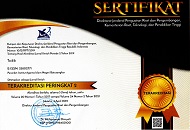THE CONCEPT OF “FREEDOM OF LEARNING” IN A MULTICULTURAL EDUCATION PERSPECTIVE
Abstract
This paper seeks to examine the concept of “Merdeka Belajar” or “Freedom of Learning” which was initiated by the Indonesian Minister of Education and Culture, Nadiem Makarim. The study of freedom of learning uses text study with content analysis method. The concept of “Freedom of Learning” is very interesting when studied with a multicultural education perspective. Moreover, the two concepts have the same relevance and spirit, namely freedom and justice in the human resources development context, particularly through the educational process. Based on the results, the implementation of “MerdekaBelajar” program so far includes four aspects, namely financing, teachers / educators, assessment, and graduates. In a multicultural perspective, problems in management and assessment aspects basically caused by a misunderstanding of the meaning of standards and standardization. Meanwhile, the teacher and graduate aspects lie in the importance of developing multicultural competencies.Integrating a multicultural education perspective in the “Freedom of Learning” policy also transforms an education system that is creative, innovative, and character.
Keywords
Full Text:
PDF (English)References
Bury, J. B. (1913). A history of freedom of thought (Vol. 74). London: Williams and Norgate.
Cleaver, F. (2007). Institutions, Agency and the Limitations of Participatory Approaches to Development.–Bill Cooke & Uma Kothari (eds.) Participation: The New Tyranny?, 36–55. London: Zed Books.
Dewantara, K. H. (1977). Bagian I Pendidikan., Yogyakarta. Majelis Luhur Persatuan Tamansiswa.
Drisko, J. W., & Maschi, T. (2016). Content analysis. Pocket Guides to Social Work R.
Fadriati, F. (2020). Model Pelatihan untuk Meningkatkan Kompetensi Guru Pendidikan Agama Islam Sekolah Dasar. Ta’dib, 23(2), 249–260.
Gorski, P. C. (2010). The challenge of defining multicultural education. Tersedia [online] Juga Di Http://www. Edchange. Org/multicultural/initial. Html [diakses Pada Tanggal 10 Desember 2020].
Kemdikbud. (2019). Empat Pokok Kebijakan Merdeka Belajar.
Kemdikbud. (2020a). Buku Panduan Merdeka Belajar - Kampus Merdeka (1st ed.). Direktorat Jenderal Pendidikan Tinggi Kemdikbud RI.
Kemdikbud. (2020b). Guru Penggerak. https://sekolah.penggerak.kemdikbud.go.id/
Kemdikbud. (2020c). Kemendikbud Luncurkan Program Merdeka Belajar Episode 5: Guru Penggerak. https://www.kemdikbud.go.id/main/blog/2020/07/kemendikbud-luncurkan-merdeka-belajar-episode-5-guru-penggerak
Kemdikbud. (2020d). Merdeka Belajar Episode Keenam. https://www.kemdikbud.go.id/main/blog/2020/11/merdeka-belajar-episode-keenam-transformasi-dana-pemerintah-untuk-pendidikan-tinggi
Kemdikbud. (2020e). Merdeka Belajar Episode Ketiga: Perubahan Mekanisme Bantuan Operasional Sekolah (BOS) Tahun Anggaran 2020.
Kemdikbud. (2020f). Organisasi Penggerak. https://sekolah.penggerak.kemdikbud.go.id/organisasipenggerak/
Kemdikbud. (2020g). Peraturan Sekretaris Jendral Nomor 4 Tahun 2020 Tentang Pedoman Program Organisasi Penggerak Untuk Peningkatan Kompetensi Pendidik dan Tenaga Kependidikan. https://penggerak-cdn.siap.id/s3/organisasipenggerak/Pedoman-Program-Organisasi-Penggerak.pdf
National Association of Multicultural Education. (2020). Definitions of multicultural education. https://www.nameorg.org/definitions_of_multicultural_e.php
Nieto, S. (2004). Critical multicultural education and students’ perspectives. The RoutledgeFalmer Reader in Multicultural Education, 179–200.
Oviyanti, F., Indrawati, I., Rochmiatun, S., Huzaimah, A., Zuhdiyah, Z., & Alfurqan, A. (2020). The Evaluation of National Qualification Framework Curriculum (KKNI) at UIN Raden Fatah Palembang. Ta’dib, 23(2), 201–212.
Sleeter, C., & Carmona, J. F. (2017). Un-standardizing curriculum: Multicultural teaching in the standards-based classroom. Teachers College Press.
Swaine, L. (2018). Freedom of Thought as a Basic Liberty. Political Theory, 46(3), 405–425.
Swartz, E. (1992). Compensatory to a Scholarly Foundation. In Research and multicultural education (p. 32).
Tempo. (2019). Nadiem Makarim: Merdeka Belajar adalah Kemerdekaan Berpikir. https://nasional.tempo.co/read/1283493/nadiem-makarim-merdeka-belajar-adalah-kemerdekaan-berpikir
UNHR. (2020). Some others key rights of the freedoms of thought, conscience, religion, opinion, expression, association. https://www.ohchr.org/_layouts/15/WopiFrame.aspx?sourcedoc=/Documents/Publications/Slides/SlidesChapter12.pptx&action=default&DefaultItemOpen=1
DOI: http://dx.doi.org/10.31958/jt.v24i1.2759
Refbacks
- There are currently no refbacks.
Copyright (c) 2021 Sukron Mazid

This work is licensed under a Creative Commons Attribution-NonCommercial 4.0 International License.
TA'DIB with registered number e-ISSN: 2580-2771, p-ISSN: 1410-8208 have been indexed on:

Journal Ta'dib distribute under Lisensi Creative Commons Atribusi-NonKomersial 4.0 Internasional.
Contact us: Ta'dib; Address: FTIK, Universitas Islam Negeri Mahmud Yunus Batusangkar; Jl. Sudirman No. 137 Lima Kaum Batusangkar, Tanah Datar, Sumatera Barat, Indonesia. Email: takdib@uinmybatusangkar.ac.id


























